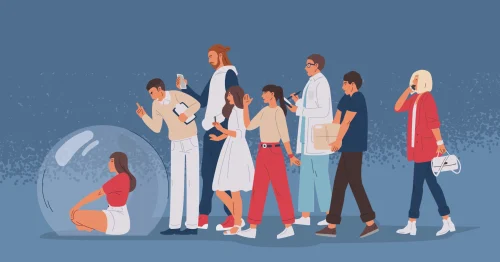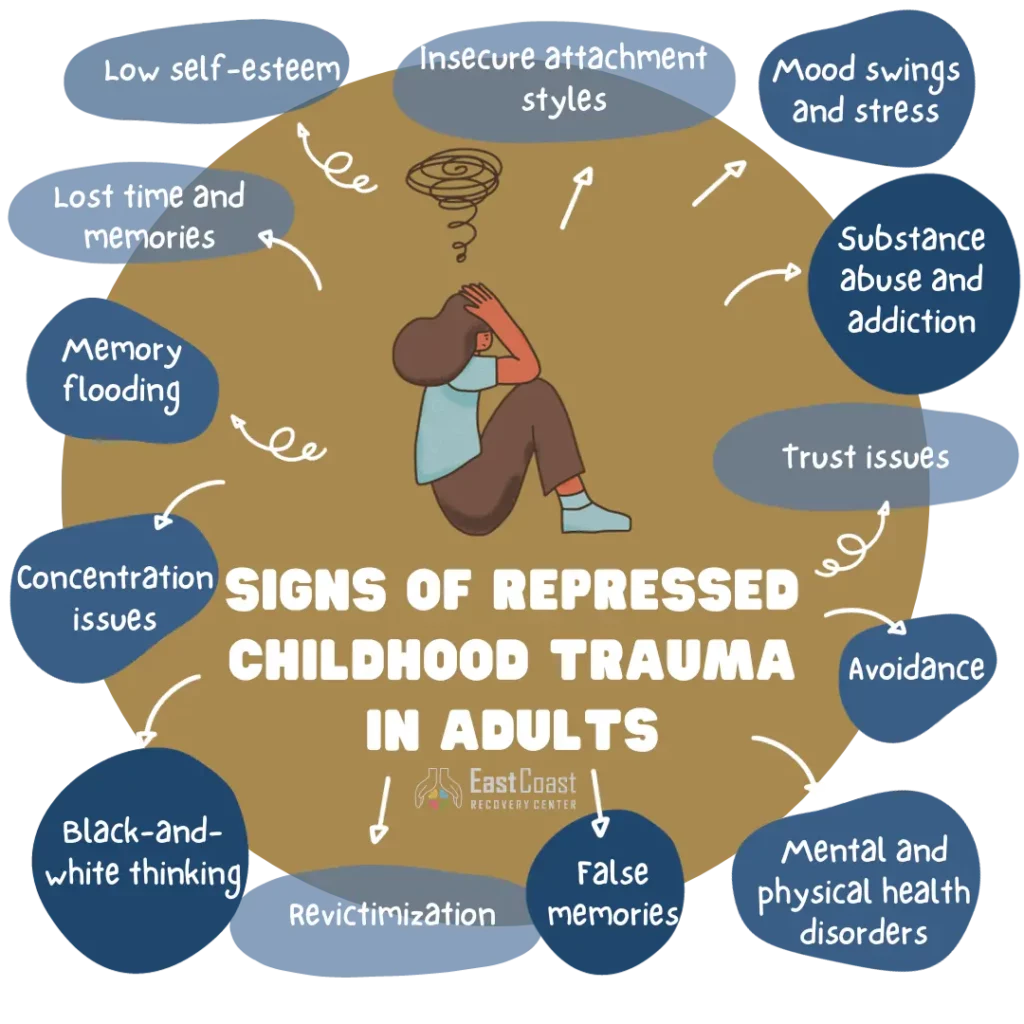The mind has strange ways of dealing with stress and traumatic events, including repressing or fogging negative events and situations we experienced as children. Some people might catch this early on if they’re addressing other mental health challenges or conditions.
However, many adults with repressed childhood trauma can go through adulthood without realizing why they respond to certain people, places, or experiences in confusing ways. This can impact their physical and mental health, relationships, and careers, leading them to unhealthy coping mechanisms like substance abuse.
This brief article explains what causes repressed memories, signs you or someone you know has repressed childhood trauma, the difference between unresolved and repressed trauma, and various treatment options available to anyone looking to process these feelings and emotions.

Connect With Us Now
Reach out to us now for immediate support, or let us know the best time to contact you through our confidential callback service. Your journey to healing is just a conversation away.
What Causes Repressed Memories?
Repressed memories are caused by adverse childhood experiences (ACE) and is the brain’s response to traumatic events to minimize or eliminate negative feelings and protect our minds from overwhelming pain. This can result from a single event, like witnessing someone you love die or watching your parents divorce, and long-term events that happen multiple times, such as physical abuse, neglect, or sexual abuse from a parent or guardian.
Trauma can also affect the brain’s ability to form or create memories and can lead to dissociative amnesia, where you can’t remember critical information about your life beyond traumatic events. Adverse childhood experiences can also lead to the development of complex posttraumatic stress disorder and various other social, psychological, and physical health-related conditions.
The most common ACEs include but are not limited to:
- Domestic and physical abuse: Experiencing physical abuse or witnessing a family member suffer from abuse can result in a constant state of fear and paranoia that slowly numbs the mind into forgetting the root cause.
- Verbal abuse: This can come from parents, relatives, older siblings, and even teachers or other children.
- Sexual abuse: This can severely impact a person’s ability to form intimate relationships and even friendships in adulthood.
- Physical and emotional neglect: This can impact an individual’s attachment style and self-esteem.
- Parent of guardian(s) with substance use disorder: This can impact a person’s behavior and relationship with alcohol or drugs, possibly leading to their own development of a substance use disorder.
- Family member(s) with mental health disorders: Witnessing a family member struggle with a mental health disorder can create a stigma against other individuals they meet in adulthood with the same conditions.
- Disappearance or absence of parent(s): This can be from divorce, incarceration, abandonment, and death.
Note: Some researchers debate the validity of repressed memories and claim it’s rare to completely forget early childhood trauma, even saying that recovered memories are inaccurate. However, this can invalidate an individual’s experience and shame them into believing their trauma isn’t real or important.

Take Our Addiction Quiz For Recovery Insights
Signs Of Repressed Childhood Trauma
Repressed memories can severely impact adulthood, even if the individual isn’t aware of these memories. They might dismiss glimpses of memories as false or perceive them as “not as bad” as they think or feel, which can contribute to various illnesses, relationship and trust issues, and unhealthy coping mechanisms.
The most common signs of repressed childhood trauma include:
- Lost time and memories: Trauma survivors can have trouble accessing childhood memories, blocking out weeks, months, and even years of their childhood. This dissociation is common in trauma survivors and can make them feel detached from their thoughts, feelings, and physical bodies. These dissociations can appear at random or triggered moments and appear as if the individual isn’t mentally present.
- Memory flooding: Sounds, sights, and even scents can cause individuals with repressed memories to feel an overwhelming sense of discomfort or tension, known as being “flooded” with emotions or memories. This can cause them to relive the memory and suffer from panic attacks, intense fight or flight responses, flashbacks, shame, anger, disgust, and grief.
- Black-and-white thinking: Also recognized as borderline personality disorder splitting, black-and-white thinking leads individuals to categorize things or people as inherently good or bad. Initially employed as a rapid response to stress for swift decision-making, it can gradually evolve into the default reaction for various situations. This can lead to impulsive and erratic behavior.
- Trust issues: Children who went through being abandoned or had unreliable guardians might think the same issues will happen when they grow up. This can make them hyper-independent in their relationships, pushing people away when stressed.
- False memories: Some researchers noted that trauma survivors can “misremember” childhood events. These memories are not meant to receive attention but can be actual visual and auditory memories that are vivid and extreme. Some experts suggest these false memories are the brain’s way of filling in gaps left by dissociative amnesia.
- Mental and physical health disorders: Individuals who suffer from childhood trauma are two to five times more likely to suffer from mental health disorders and physical illnesses.
- Substance abuse and addiction: Adults with high ACE “scores” are more likely to turn to coping mechanisms like substance abuse, smoking, binge eating, and even sexual addiction to suppress or numb their emotions.
- Insecure attachment styles: Adults with repressed childhood memories can struggle to develop healthy and stable relationships and have an extreme sense of abandonment. The most common insecure attachment styles include anxious-ambivalent, disorganized, and avoidant.
- Low self-esteem: Trauma survivors can blame themselves for their negative experiences and struggle to feel confident throughout adulthood, in relationships, jobs, or personal goals. It can be easy to slip into a cycle of wanting to improve, feeling overwhelmed while processing emotions, and slipping back into insecurity.
- Mood swings and stress: Repressed childhood memories can cause a build-up of cortisol, a stress response hormone that signals fight or flight reflexes. This stress can overwhelm an individual and cause them to release and feel anger, sadness, and irritability suddenly.
- Concentration issues: Repressing memories can take up mental “bandwidth,” even if the person isn’t aware their brain is working in the background. This can result in them being easily distracted, disorganized, and forgetful, similar to symptoms of ADHD and PTSD.
- Revictimization: Some trauma survivors can consciously or unconsciously repeat the actions and behaviors they experienced as children. This can be in the form of abusing or neglecting their friends, family, or intimate relationship’s emotional and physical needs. One study found that one-third of sexual abuse perpetrators were sexually abused themselves.
- Avoidance: Some individuals can subconsciously avoid certain people, places, situations, and things that trigger these repressed memories and emotions. Some survivors might avoid their hometown, family members, or conversations about their childhood. The opposite is also true, with individuals constantly seeking answers to their repressed emotions but getting nowhere with apathetic friends or family.

Unresolved Vs. Repressed Childhood Trauma
The difference between unresolved and repressed childhood trauma is if the individual is aware they suffered traumatic experiences. Some individuals might be completely aware they were abused or sexually assaulted but aren’t prepared or have the resources to face their emotions and feelings.
Someone with repressed childhood trauma can eventually realize their past, harboring a reluctance to confront the associated emotions for fear of the intense feelings that may surface during emotional exploration. Others might feel like their trauma isn’t important enough to focus on or even affects their adulthood, even though others around them can tell they have things to work on.
Read more: Depression Clinics Near Me in Boston

Treatment Options For Repressed Childhood Trauma
If you think you are suffering from repressed childhood trauma, find a therapist specializing in trauma and any other symptoms you might be experiencing as a result, such as anxiety, depression, and attachment issues. This is one of the best things you can do for yourself. From there, a qualified therapist can recommend a specific therapy method that would work for you and possibly refer you to a psychiatrist to discuss medication.
Some of the most common types of therapy that can help with trauma include:
- Cognitive behavioral therapy: This method doesn’t try to make you forget or “move on” from childhood trauma but restructures your beliefs and feelings toward them. This can help people who blame themselves for their trauma or don’t believe they can ever move past their experiences.
- Eye movement desensitization and reprocessing: EMDR therapy was developed in the early 90s and uses bi-lateral eye movement stimulation to address unresolved childhood trauma. Effective for PTSD and various traumas, it operates on the premise that emotional regulation enhances the brain’s capacity to process and heal from traumatic memories, potentially “unsticking” them for better processing and healing.
- (Prolonged) exposure therapy: Exposure therapy involves creating a safe environment where individuals can talk about the traumatic event, listen to recordings of the event, or write the memories down and read them aloud. This can be extreme and challenging, but there are hundreds of cases where exposure therapy successfully helps people reduce negative emotions and turmoil from repressed childhood trauma.
Trauma-Informed Care In Boston, MA
If you or someone you know is struggling or showing signs of repressed childhood trauma, contact East Coast Recovery Center in Boston, MA. Our trauma-informed care program is dedicated to helping individuals struggling with trauma and co-occurring substance use disorders.
We understand how traumatic experiences can cause individuals to turn to substances to cope with overwhelming emotions and memories, and we are dedicated to providing the recovery and treatment methods you need. Don’t wait. Call today and discover true wellness.
Are You Covered For Treatment?
East Coast Recovery Center partners with numerous private insurance providers. Our team is committed to assisting you in quickly and effortlessly verifying your insurance coverage for treatment.











